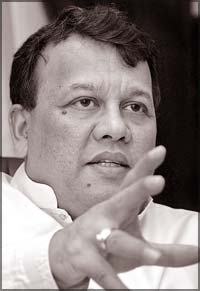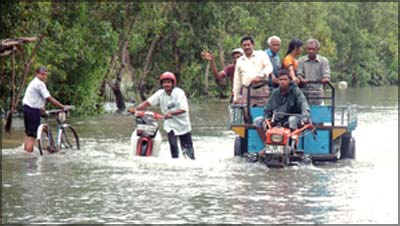Disaster Risk Management and Planning
Address by Disaster Management and Human Rights Minister Mahinda
Samarasinghe at the Second Session of the Global Platform for Disaster
Risk Reduction Geneva, Switzerland on June 17, 2009.
This conference follows close upon the launch of the biennial “Global
Assessment Report: Risk and Poverty in a Changing Climate”, which is a
significant milestone in the annals of global disaster management.
|

Disaster Management and Human Rights Minister
Mahinda Samarasinghe |
We in Sri Lanka, welcome this landmark document launched recently by
UN Secretary-General Bank Ki-moon, which also publicized the Mortality
Risk Index which is a very interesting and potentially useful new tool
in the hands of planners, policy makers, development specialists and
disaster management personnel the world over.
As a member of the South Asian Association for Regional Cooperation (SAARC)
and a country that participated in the development of the South Asian
Comprehensive Regional Framework on Disaster Management adopted by the
SAARC Council of Ministers for the 2006 - 2015 period, Sri Lanka notes
with concern that some countries in the SAARC sub-region are placed
relatively high on the index.
In this context, our efforts at regional disaster risk reduction must
be redoubled and as most of our countries are beset with poverty and
other developmental challenges, an integrated and holistic approach must
be adopted in keeping with the global strategies and modalities, such as
those developed and refined through forums like the Global Platform.
Sri Lanka has made vast strides in developing a structured and
scientific approach to disaster management. Sri Lanka was one of the
countries that bore the brunt of the catastrophic tsunami of December
2004: At that time our preparedness and ability to respond left much to
be desired.
Since then, we have, with the support of several international
partners and friends, devised normative and institutional frameworks and
put in place a forward looking and integrated strategy to place disaster
risk management at the forefront of all aspects of national development
planning.
We have adopted a 10-year Road Map for Disaster Risk Management at
the national level and have participated in the regional framework I
mentioned earlier.
Both these initiatives are fully emulative of the Hyogo Framework for
Action, 2005 to 2015. These initiatives are good examples of regions and
countries evolving regionalized and localized initiatives in keeping
with globally agreed-upon frameworks.
I await with particular interest the outcomes of this conference
which is expected to bring together national best practices in
mainstreaming disaster risk reduction in national development planning.
This is something that we in Sri Lanka are keenly interested in and
are greatly encouraged by a global focus on this most important aspect
of any integrated development strategy.
Moving from disaster-sensitive national development planning to
integrating disaster risk reduction as a core component of the planning
process is a development that we wish to see coming to fruition.
Another expected outcome is the harmonization of DRR with climate
change adaptation and development strategies which, to me, is a
corollary of the first major outcome.
Climate change is a global phenomenon which needs prioritization on
the world’s agenda as it has implications not only for development but
for the very survival of some members of the international community.
We fully endorse and support the Global Platform’s focus on climate
change adaptation as one of the key feature of the deliberations during
this week.
|

Climate change is a main factor of natural disasters |
Another matter that we are keenly interested in, is the evaluation of
the Global Assessment Report and its potential to devise new strategies
for Governments and civil society actors to further cooperation in DRR
and other aspects of disaster management.
The identification of lacunae such as information on droughts - in
addition to tropical cyclones, earthquakes, floods and landslides which
the index is broadly based on - in developing the MRI leaves us much
work to do and we must work together in a spirit of cooperation to
further enhance this tool which will make it an invaluable tool in
planting for better disaster risk management.
We also look forward to the rigorous review of the Hyogo Framework
for Action and the assessment of where we, individually and as a global
community, have come in fulfilling the aims and objectives of that
framework.
I am certain that, throug the use of online tools provided by UN ISDR,
will help us gain a better understanding of where we stand vis-a-vis the
Hyogo Framework.
I am also sure that the more than 40 thematic special events
scheduled, that are intended to complement and support these plenary
sessions, will provide subject specific outcomes that we can all take on
board.
These interactions will assist in prompting not only greater
investment in DRR which is an objective of this forum but smarter,
better targeted investment.
I was fortunate to participate in the International Conference on
Gender and Disaster Risk Reduction in Beijing two months ago. In as much
as we have come to recognize that DRR is a critical component of
development planning, we must view gender issues, governance,
sustainable development strategies and the maintenance of
socio-political stability as inextricably linked and cross-cutting
facets of any national policy framework.
It is by recognizing the importance and value of affording men and
women of all races, creeds, linguistic backgrounds and cultural
affinities the equal opportunity to contribute to DRR, governance, peace
building and development, that we can truly evolve equitable solutions
that can guarantee a better and safer future for the world’s people.
The outcome I referred to earlier in my statement, in relation to
government-civil society partnership, will help greatly in supporting
and fostering inclusive DRR and development.
To my mind, information sharing and building of community resilience
and capacity to contribute to DRR as well as the fostering of necessary
attitudinal changes are a key contribution that civil society actors can
make in complementing and enriching government-led initiatives in
relation to DRR.
My country - Sri Lanka - has just overcome a human-made disaster of a
magnitude unparalleled by any similar recent events elsewhere. We have
overcome the scourage of terrorism that has beset our island nation for
well over two decades. From a humanitarian standpoint we have now moved
into a “care and maintenance” phase which is the initial phase of early
recovery.
The Government of President Mahinda Rajapaksa has taken on the task
of reconstructing a nation which has suffered much in its efforts to
reunite its people ensuring that all Sri Lankans are now able to lay
claim to one, undivided territory as their common Motherland.
A coordinated and comprehensive program has recently been launched
for the North which will mirror our achievements at restoring normalcy
in the East.
All our efforts at renewal, rebuilding and resettlement, however will
be put at risk if the cause factors of the conflict and terrorism are
not addressed and our President has committed himself to evolving a home
grown political response to those factors.
Borrowing from DRR methodology, our political response will reduce
the risk of a renewed human-made disaster, i.e. terrorism and conflict,
through systematic efforts to analyse and manage the casual factors,
evolve consensual responses and improved preparedness for adverse
events. We do not for a moment think that Sri Lanka’s national renewal
will be quick or easy.
There are ever-present threats that we must, and will, guard against,
including the threats of new violence and destablization.
As we move forward on the path to a safer tomorrow for all Sri
Lankans, we look to the many good friends of Sri Lanka for their
understanding, support and cooperation in helping us achieve our
objectives. |



